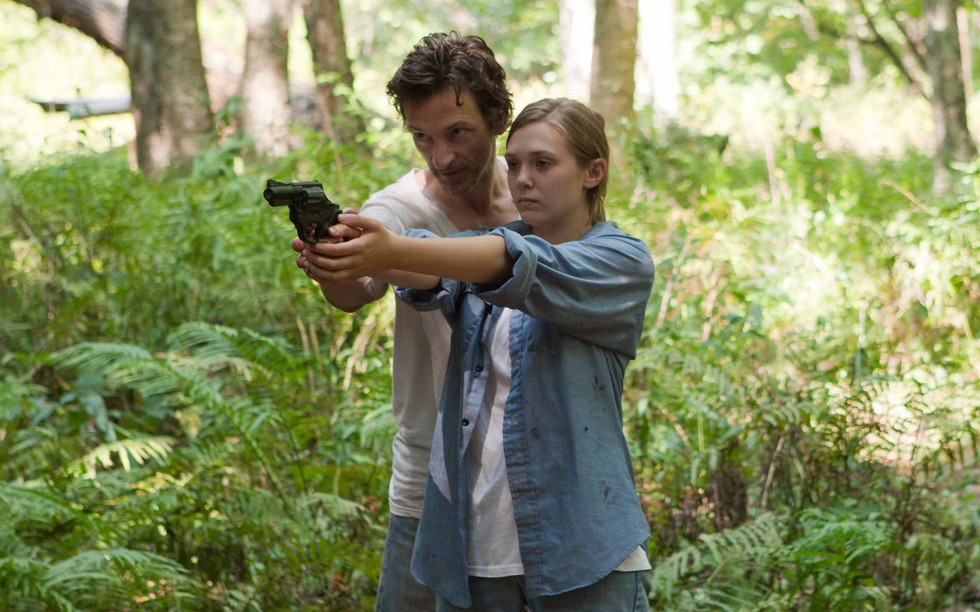John Hawkes’ House Rules

JOHN HAWKES WITH ELIZABETH OLSEN IN MARTHA MARCY MAY MARLENE
FILM STILL COURTESY OF FOX SEARCHLIGHT
While flashbacks in film portray a character’s memories, a filmmaker’s access to their construction is less infinite—excessive underpinning is often dull surplus. Unlike memory, where we store and then recall, flashbacks require a single dip that interjects the past into the present, somewhat magically. In Sean Durkin’s feature debut, Martha Marcy May Marlene, flashbacks are not only used to tell a story, but to plot two disparate—yet eerily agreeing—worlds: a cult that functions as a family and a family that in its sterility and staged propriety evokes cult-like isolation. In one scene, Martha, bewitchingly played by Elizabeth Olsen with the pulpy steadfast innocence of a young Maria Schneider, pees herself as a memory from the cult she’s escaped haunts her. A patch on her pink dress darkens, and Martha, startled, stuffs it with childlike guilt under the bed in her sister’s spotless summer home.
Moments like these reveal the fine line between safety and otherness, or how so quickly a benign relationship can turn dire. Shot beautifully by Jody Lee Lipes, the slightest bruise on Martha’s leg, her cagey stare seen through a door left ajar, or sooty faces in modern settings, or two sisters silently observing each other’s faces in a single mirror, all suggest fear and disconnect, and the inability to express all that is wrong.
John Hawkes as Patrick, the leader of this farmhouse cult, is a gangly, guitar-playing father figure who veers away from the typical formula; his soft voice and sound encouragement nudge here, bait there. Hawkes spoke to Interview about his role, a newer way of approaching this particular character, and working with newcomer Elizabeth Olsen.
DURGA CHEW-BOSE: I had such an immediate reaction to Martha Marcy May Marlene and I haven’t stopped thinking about it since. It lingers.
JOHN HAWKES: I hear that a lot, and I feel the same way. I can tell you it’s been the weirdest thing that I saw the movie at Sundance and then I saw the movie again last night, and several times in my mind I’ve had this weird haunted feeling about a scene in a movie and thinking, “What movie was that?” and remembering, “That’s a movie I was in!” [laughs] And not necessarily the work I did, but the feeling of it and realizing that I’d actually experienced it as if I was not even in the film in retrospect. What are the odds?
CHEW-BOSE: Your character, the cult leader Patrick, cleverly combines persuasiveness with an earnest glow. While there is something inherently threatening about him, there’s an ease to Patrick. He just as easily rapes a new member as he picks up his guitar a day later and serenades her.
HAWKES: Sure, sure, sure. For me and for I’m sure any actor, each role is a different challenge to prepare for in a different way. I’m normally kind of an over-preparer and over-researcher, and for this film took a different tactic than I’m used to. I worked almost by subtraction in a way. I didn’t want to play the cliché cult leader; I’ve seen it too many times, and it’s annoying to me just in general. I made the joke a lot lately that there’s an annual Charles Manson movie. So I read this script not even very excited to read it, but it immediately fascinated me, and it was told through the eyes of this fascinating young woman. So as far as approaching Patrick, besides not wanting to retread what I’d already seen, it made the best sense for the story—and that was always the first question for me in any project, is “What is the story? And then how can the character that I’m playing help tell that story in the most effective way?”
If Patrick had been an obvious con man or a moustache-twirling Svengali, you know, pure-evil-at-a-first-glance kind of guy, I don’t think we’re as interested in Lizzie’s character, Martha. I mean, if we can understand why she wanted to follow this person, then I think we’re with her on the journey. For the story, to find dimension and depth in Patrick and to not tip his hand immediately, it’s often fun as an actor to figure out the ultimate truth of a character and then through layers and layers and layers on top of that, I’d rather just peek out once in a while. It’s always thrilling for me as an audience member when I see that kind of thing. We chose a more nuanced Patrick than others might have.
CHEW-BOSE: The men in this film are Patrick, then Watts—a young, militant and often very menacing and deluded follower—and Ted, the self-serious husband of Martha’s sister, who acts as a foil to Patrick, and yet exudes a similarly perverse and profound need for control, “big picture” plans, and a watchful eye over Martha. I was wondering what you thought Patrick’s personal story was, and how he got to where he was with this “family” on this farm? What was his belief system that eventually got him to this point? We learn very little about him and yet he has extreme manipulative powers. Was he once more like Ted? Or Watts? Or neither?
HAWKES: I’m kind of like Sean and Lizzie in that that unlike other films, it’s a back story I’m less ready to reveal. It’s mostly because there’s so much unsaid in the movie and so much back story, and in an interesting way, that’s the most compelling part of it.
CHEW-BOSE: Right, there’s definitely this responsibility and alertness that the audience has to adhere to in order to piece things together…
HAWKES: Yes, yes. Well, what’s cool as an audience is how often in film, in a projected amount of time, half the movie is spend with her sister and her brother-in-law who we as an audience know way more about the situation. It’s always interesting to watch them grapple. But as far as back story, I’ve thought about those things not as in-depth as I normally would. Sean and I talked about how the farmhouse has began. Maria Dizzia’s character we thought was first, and maybe she and I were lovers, so then people began to stumble by and whatever. It was pretty random. I normally like to be incredibly specific with these things, and I think I was, before we began to shoot and then elected to forget it all and let it kind of happen and be inside me in a place that I wasn’t accessing but was still in there. So, forgive me for being elusive about it, but those kind of things I think are more interesting left unsaid.
CHEW-BOSE: Lizzie’s performance in MMMM is infectious. What was it like working with her on her first feature?
HAWKES: She’s a really delightful human being to star with. I wasn’t even aware of her family history until a couple days into work. She’s got a really intelligent way of working; she’s giving, she’s vulnerable, she’s brave. And she’s an old soul, for sure. And I had quite a similar experience a year and a half ago with Jennifer Lawrence, and just instantly feeling like this is a really formidable dance partner.
MARTHA MARCY MAY MARLENE IS OUT IN LIMITED RELEASE TODAY.






